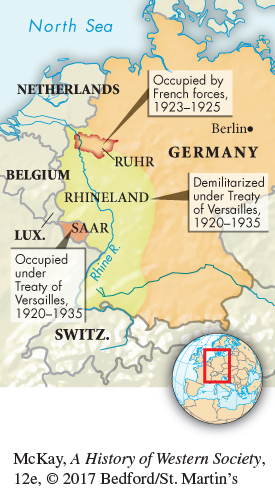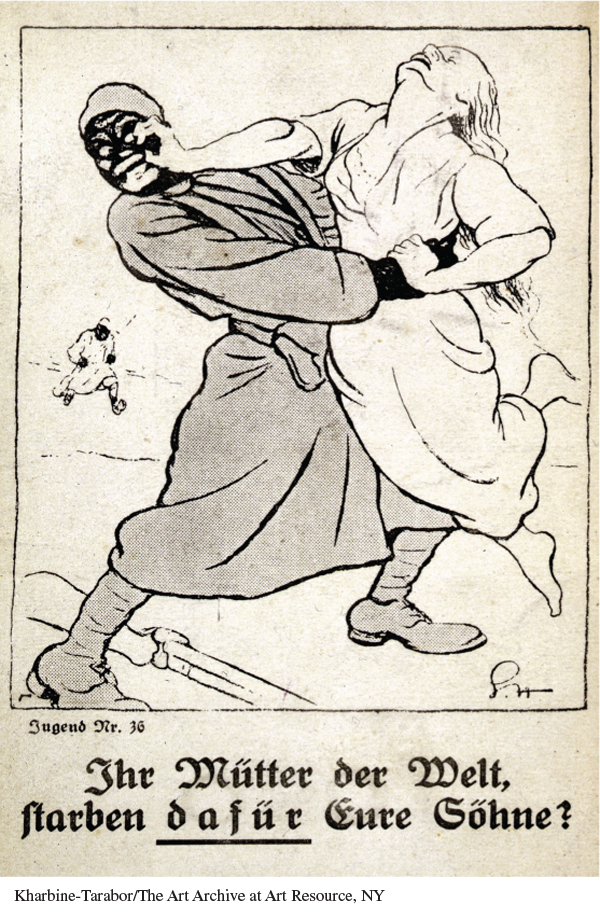A History of Western Society: Printed Page 887
A History of Western Society, Value Edition: Printed Page 850
A History of Western Society, Concise Edition: Printed Page 885
Germany and the Western Powers
Germany was the key to lasting stability. Yet to Germans of all political parties, the Treaty of Versailles represented a harsh dictated peace, to be revised or repudiated as soon as possible. Germany still had the potential to become the strongest country in Europe but remained a source of uncertainty. Moreover, with ominous implications, France and Great Britain did not see eye to eye on Germany.
Immediately after the war, the French wanted to stress the harsh elements in the Treaty of Versailles. Most of the war in the west had been fought on French soil, and the expected costs of reconstruction, as well as of repaying war debts to the United States, were staggering. Thus French politicians believed that massive reparations from Germany were vital for economic recovery. After having compromised with President Wilson only to be betrayed by America’s failure to ratify the treaty, many French leaders saw strict implementation of all provisions of the Treaty of Versailles as France’s last best hope. Large reparation payments could hold Germany down indefinitely, ensuring French security.
The British soon felt differently. Before the war Germany had been Great Britain’s second-
In addition, British politicians were suspicious of both France’s army — the largest in Europe, and authorized at Versailles to occupy the German Rhineland until 1935 — and France’s expansive foreign policy. Since 1890 France had looked to Russia as a powerful ally against Germany. But with Russia hostile and Communist, and with Britain and the United States unwilling to make any firm commitments, France turned to the newly formed states of central Europe for diplomatic support. In 1921 France signed a mutual defense pact with Poland and associated itself closely with the so-

While French and British leaders drifted in different directions, the Allied commission created to determine German reparations completed its work. In April 1921 it announced that Germany had to pay the enormous sum of 132 billion gold marks ($33 billion) in annual installments of 2.5 billion gold marks. Facing possible occupation of more of its territory, the young German republic — generally known as the Weimar Republic — made its first payment in 1921. Then in 1922, wracked by rapid inflation and political assassinations and motivated by hostility and arrogance as well, German leaders announced their inability to pay more. They proposed a moratorium on reparations for three years, with the clear implication that thereafter the payments would be either drastically reduced or eliminated entirely.
The British were willing to accept a moratorium, but the French were not. Led by their tough-
Strengthened by a wave of German patriotism, the German government ordered the people of the Ruhr to stop working and offer passive resistance to the occupation. The coal mines and steel mills of the Ruhr fell silent, leaving 10 percent of Germany’s population out of work. The French responded by sealing off the Ruhr and the Rhineland from the rest of Germany, letting in only enough food to prevent starvation. German opinion was incensed when the French sent over forty thousand colonial troops from North and West Africa to control the territory. German propagandists labeled these troops the “black shame,” warning that the African soldiers were savages, eager to brutalize civilians and assault German women. These racist attacks, though entirely unfounded, nonetheless intensified tensions.
By the summer of 1923 France and Germany were engaged in a great test of wills. French armies could not collect reparations from striking workers at gunpoint, but the occupation was paralyzing Germany and its economy. To support the workers and their employers, the German government began to print money to pay its bills, causing runaway inflation. Prices soared as German money rapidly lost all value. People went to the store with bags of banknotes; they returned home with handfuls of groceries. Catastrophic inflation cruelly mocked the old middle-

In August 1923, as the mark lost value and unrest spread throughout Germany, Gustav Stresemann (GOOS-